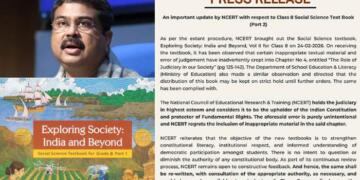Allahabad High Court vs Waqf board: The “Islamic Conundrum’ is the most pressing issue that has always frightened politicians. These feeble and power-hungry politicians always choose to take the easy way out to safeguard their Muslim vote bank. By audaciously flashing a secular card, rather than a VETO, they whitewash serious crimes, land grabbing, and blatant cases of appeasement. Every sane voice pointing towards this menace is silenced in the name of secularism.
But the fact is that even after 75 years of political spoon feeding to the demands of the Muslim representatives, institutions like Waqf boards and clergies – only mullahs, politicians and Waqf boards have fattened while the state of the common Muslim community has only worsened further.
This behemoth, particularly the Waqf board and its ilk, have not even spared any non-constitutional or constitutional body, including the judiciary. It has tried time and again to swallow their properties. In fact, the recent case should be an eye-opener for every citizen, including those sitting in the power corridor, against the illicit, unconstitutional, and unabated power of Waqf boards to usurp any property.
Allahabad High Court wins legal battle against Waqf board
Every political party and institution within the country is guilty of placating every illogical demand of the Muslim representatives. This abject surrender to Muslim clergy and politicians has done no good either for the nation or the ordinary Muslim community. Additionally, the appeasement of Muslim representatives has also tainted the authority of these institutions. The Waqf board’s challenge to the authority of the judiciary was recently visible in its full glare. It raises two serious questions that we as a society have to ponder, but before that, let us understand the latest case.
Recently, the Supreme Court upheld the Allahabad High Court’s earlier order that directed the concerned authority to remove the mosque from its premises. The apex court dismissed the special leave petitions that wanted the apex court to set aside the 2017 judgment of the Allahabad High Court.
The Supreme Court, led by Justice M.R. Shah, reaffirmed the High Court decision, stating that the disputed property in question was required for a public purpose and that there were compelling reasons for the removal of the said Masjid.
In addition to allowing the removal of the mosque, the Supreme Court also warned the mosque’s authority to vacate the premises within three months. In case of non-compliance, the apex cout has permitted the Allahabad High Court to get the Masjid removed or demolished.
Earlier in this case, the Allahabad High Court had ordered the removal of this mosque so that it could have the land for its own use or expansion. Back then, the High Court too had given the Masjid Committee three months to vacate the High Court premises. In 2017, the Waqf Masjid High Court and the U.P. Sunni Central Waqf Board moved to the Supreme Court, asking for respite from the Court from the judgment of the Allahabad High Court.
Also read: Are Waqf Boards even legal? An answer is expected soon
Case facts
The Supreme Court’s judgment was not a complete setback for the Masjid authority and Waqf board. The top constitutional court allowed the petitioners to file a detailed representation before the state government in which they can seek allocation of an alternate space nearby. However, it added that such land, if available for the construction of a mosque, should also not be earmarked for any other public purpose, whether present or future.
The decision of the top court was based on the fact that the mosque in question was built on government-leased land and its grant was cancelled way back in 2002. Interestingly, the Supreme Court while delivering its judgment noted that it had already affirmed the resumption of the land in favor of the High Court nearly a decade earlier, in 2012 to be exact.
The Waqf Masjid High Court and the U.P. Sunni Central Waqf Board were represented by former Congress veteran Kapil Sibal and Senior Supreme Court Counsel Indira Jaisingh. When the petitioners’ counsel used the rhetorical argument to substantiate their claim, they were humiliated.The appellants argued that they had been there for many years.
The SC bench came down heavily on this sham of an argument. The bench remarked, “You do not have any rights; you cannot claim to continue in possession as a matter of right. It was a leased property. Can leased property be made Waqf? The lease had already been terminated and resumed. It was confirmed in 2021 by this court”.
This unequivocal remark by the bench was a factual slap in the face to the rhetorical cabal that has defended countless such crimes on the basis of this farce of an argument.
The petitioners’ counsel was schooled by Senior Advocate Rakesh Dwivedi, who was representing the Allahabad High Court.Mr. Dwivedi said, “The mere fact that you are offering namaz does not make it a mosque. Very often we find that on Friday people offer namaz on roads, in parks, etc., but that does not make it a mosque.”
Further, High Court counsel Mr. Dwivedi stated that the private Masjid was registered under waqf on May 30, 2002. This application and grant were done in a hurry on the same day without any inquiry and by overlooking the fact that the Chief Executive Officer was the Deputy Secretary of the Government. Accusing them of quid pro quo, Mr. Dwidevi said, “They collaborated with the petitioners.”
The timeline of this case
The present building of the Allahabad High Court was constructed in 1861. A nearby plot of land was given on lease to a Muslim person with the precondition that he cannot build on it and cannot transfer the land. In 1988, the lease on the land was renewed for another 30 years, which was to end in 2017.
1861: Present building of Allahabad High Court was constructed.
Few years later: A Naxul land on lease was given to a Muslim person.
Lease was granted as per Govt Grants Act.The clauses of lease clearly restricted that one cannot build and cannot transfer the land.
2/23
— Shashank Shekhar Jha (@shashank_ssj) March 13, 2023
So another request for renewal of a lease for residential purposes was filed. However, in the meantime, a mosque was illegally constructed over this land within the premises of the Allahabad High Court. Later, the same mosque was opened for public use.
In December 2000, the authorities came to know about this issue, after which the collector canceled the lease by issuing a notice. Thereafter, the Masjid representatives filed a Writ Petition before the Allahabad HC. After hearing the matter, the High Court passed an order against this illegal mosque while observing that there was no mention of a mosque on the lease.
In 2002, SC ordered status quo. Interestingly, it is the first time that the Waqf Board has come into play in this matter, coincidentally after the stay order.
On May 30, 2002, an application was filed to register the property as Waqf property. The very same day, the property was registered as a waqf. With draconian power, the Waqf has peddled the wrong notion that even after usurping illegal property, it will remain with it forever. It is claimed that ‘Once a Waqf, always a Waqf’. The rest of the timeline was as stated earlier.
Also read: No more legal immunity for the Waqf Board!
Misdirected legal fight?
This was a classic case demonstrating the Waqf board’s heinous power and illegalities.It is not a major victory but rather a minor battle won in the larger war. It is always advisable to remember that the key to winning any battle is choosing the right terrain. Earlier, there had been blatant land usurping by Waqf boards, even galloping an entire village in Tamil Nadu. So, it is important to understand the root problem of this, which is the Waqf Act, which has bestowed unquestionable power and authority to claim any authorities as its own. Rather than reclaiming one land piece at a time, it is high time that such acts are amended radically or even repealed at once.
To be honest, Waqf Boards are the sheer example of the modern-day Zamindars and Thekedars of the Muslim community. They have sold the common rights of Muslim citizens so as to fill their own coffers. Through the Sacchar Committee report and similar countless reliable sources, it is clear that these appeasement tactics have never percolated to the ordinary Muslim citizen, who is still in economic and social peril. So, it is high time to ensure democratization within the Muslim community and strike hard against this thekedari of Waqf boards and clergy.
Support TFI:
Support us to strengthen the ‘Right’ ideology of cultural nationalism by purchasing the best quality garments from TFI-STORE.COM

























